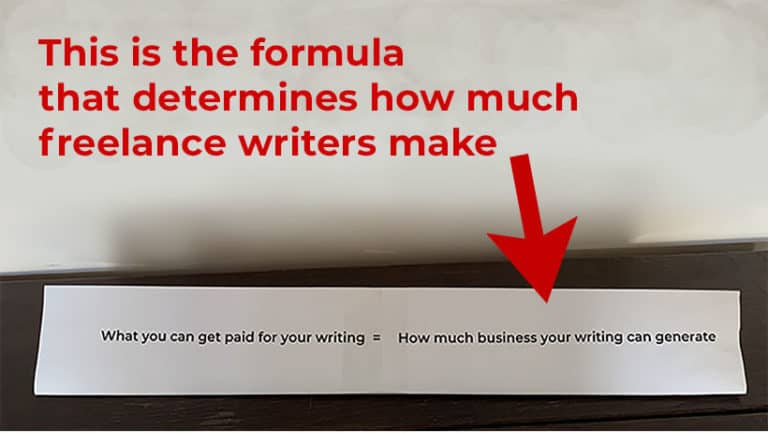How to Get Started With Freelance Content Writing: 12 Things You Need to Know, Have, or Be Able to Do
So you want to get started with freelance content writing…? Good for you! This can be a great way to make a part-time or full-time income or to supplement your income while you look for full-time work. You can use it as a way to earn money while you learn about a specific industry or topic, or as a way to get some research done while you write a book.
But where to start? And how to start? It’s easier than you might think, but you will probably need these twelve things to get started.
Skills You’ll Need To Get Started With Freelance Content Writing
1. Be able to write well.
Writing well means you:
* Know how to write clearly so people understand you.
* Are always thinking about your readers, and how they will understand (or not understand) what you’re writing.
* Deliver content that has no typos, misspellings, or severe grammatical errors.
* Know how to use commas and other punctuation marks.
* Have a large enough vocabulary to know when to use the right word.
know someone who needs a content writer AND who knows how to monetize the content you give them well enough to pay you well.
“To pay you well” = AT LEAST 10 cents per word, and preferably at least 20 cents per word
2. Be able to write quickly.
Content writers’ incomes are, in part, dependent on how quickly they can write. So if it’s going to take you three days to write a 1,000-word blog post, there’s a problem.
So how quickly is “quickly”? You need to be able to write a 1,000-word blog post that requires very little research in no more than six hours, maximum. And hopefully, you can write that post in less than four hours.
3. Be able to show up, meet deadlines, and not “flake out.”
In other words, you need to be able to act like a professional. This includes:
- Meeting deadlines, or at least notifying the client if you’re going to miss a deadline.
- Being able to respond to emails within 24 hours. Ideally, you’ll respond to emails within 4-6 hours, unless those hours happen overnight, over a weekend, or a holiday.
- Being polite and respectful (even if your client isn’t being polite or respectful). i.e., no temper tantrums.
- Being able to hold appointments.
Do these things seem so obvious and low bar that I shouldn’t even be mentioning them? Maybe… until you hear about all the freelancers who can’t meet these criteria.
4. Be able to follow directions.
This sometimes becomes an issue when a writer has not quite achieved point #5 (see below) and decides they’re just going to do whatever they want, and the client should be grateful for their work.
Nice try, but the client needs work to be a certain way for a reason. If a certain writer can’t follow directions, the client will have to go find a writer who can.
The Right Mindset
5. To understand that freelance content writing is not creative writing.
Your priority should be to write great content for your clients – not to seek personal fulfillment from your content writing.
I’ve met several writers who somewhat expect to be able to do whatever they want when they’re writing a piece for a client. They are used to writing for themselves and get quite put off by the idea of having to set aside personal fulfillment in order to deliver a piece of writing according to the client’s instructions. They are averse to the idea of writing about anything that doesn’t spur their passion.
I sympathize with this. I understand this. I accept this. But if this is you, and you can’t get over setting aside your personal fulfillment to do this sort of paid writing, honestly… maybe content writing isn’t for you.
As Jen Sincero wrote in You Are a Badass at Making Money, “Follow your passion and the money will come” looks great on a throw pillow, but it doesn’t do much for the bank account.”
What You’ll Need To Get Clients as a Freelance Content Writer
6. A niche, or at least familiarity with a few specific subject areas.
Niche writers typically get paid three to five times as much as generalists. They can also produce high-quality work much faster than generalists, so they earn more per hour.
You don’t need to be a full-scale subject expert to get this advantage. You don’t need a degree or decades of experience. But having solid familiarity (and several bylined clips) will make earning a living wage from content writing much easier.
7. Two or three “clips” – also known as writing samples.
Most prospective clients (especially the ones who pay well) will want proof that you can write well. You saying you can write well is nice and all, but they want proof. (Do not take this personally.)
Ideally, your writing clips will have your byline (i.e. the article will show it was written by you) and they will have been published in a professional publication or on a company website. They will also, preferably, be related to the type of content and topic of the content that you are trying to get writing work in. In other words, your clips will be “in your niche” so prospective clients will have proof you really do know about their topic or industry.
8. A well-optimized LinkedIn profile.
LinkedIn can be a fantastic source of work for freelance content writers. It beats any other social media platform hands down.
But you have to fill out your profile the right way to attract that work.
A well-optimized LinkedIn profile includes:
- A current, professional-looking headshot of you.
- The “headline” of your LinkedIn profile using a keyword that will help your ideal clients find you.
- Your contact information filled out.
- Your about section written in a way that reassures your ideal clients that you are their writer.
- Your job and experience section filled out (with links to clips, if possible).
- A header image that has a tag line or description of what you do and why clients should hire you.
- Your skills section filled out (and hopefully with at least ten endorsements).
- Semi-regular posts. Even publishing once a week is enough.
- Two or three articles. So prospective clients can see samples of your work easily.
There’s much more, but that’s a basic start.
9. A portfolio site of some kind.
This can be a website, even a simple website. It could also be a Contently portfolio page or a Journo Portfolio page.
Business Essentials You’ll Need to Get Started With Content Writing
10. An email address.
This will be the address you’ll use to communicate with clients. Extra credit if you set it up with an email signature, or “footer”.
11. One or two professional references.
Ideally, these are past clients who have written you a nice testimonial. But if you’re just starting out, you can use references from prior jobs, or even personal references if someone has worked with you on, say, a charity event or something similar.
12. A way to receive money.
PayPal is okay, but only barely okay. Get yourself a business bank account and use that to receive payment. Gusto and Zelle are also excellent ways to get paid.
Surprise: None of these things are essential
Here’s the big thing holding most people back from getting started with freelance content writing: They think they need to have everything perfect (perfect website, perfect clips, perfect business branding) in order to start getting content writing clients.
You don’t. I see my students get clients all time when they don’t have websites or clips. They get work and get paid sometimes even if they haven’t followed directions, or if they’ve missed a deadline. Or they don’t have a niche.
It’s absolutely good to want to aim for perfection. But to get started… you only have to get started.
Even if all you can do is find a friend who needs some content for a particular project, you can leap into that and officially get started with freelance content writing. Just like you can get clips just by writing articles on LinkedIn or Medium.com.
Don’t let perfectionism hold you back.




